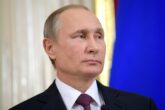April 22, 2022
After Putin: Lessons from Autocratic Leadership Transitions
The Biden administration came into office seeking to create a stable and predictable relationship with Russia. Determined to devote more time and attention to China, Washington sought to reduce tensions with Putin’s Russia in order to avoid confrontation that might derail the administration’s agenda. Yet despite Washington’s approach, relations with Russia have turned out to be anything but stable and predictable. On February 24, 2022, Vladimir Putin launched a full-scale invasion of Ukraine. Putin’s war of choice catalyzed a massive shift in international perceptions of Putin and a series of responses—ranging from punishing sanctions on Russia’s financial sector to private sector steps to curtail business operations inside the country—that have fundamentally altered relations with Russia. It is now impossible to imagine that there could be any substantive improvement in US-Russia relations while Putin remains in power.
If Washington cannot expect confrontation between the United States and Russia to abate so long as Putin is at the helm, the questions that naturally follow are: how much longer will Putin be in office, and what are the prospects that US-Russia relations could be different under a future Russian leader?
It is now impossible to imagine that there could be any substantive improvement in US-Russia relations while Putin remains in power.
Although Putin’s attack on Ukraine has increased the challenges he faces at home, he may very well be able to weather the backlash. History is rife with embattled autocrats who successfully maintained power despite domestic economic challenges and significant opposition. High and rising levels of repression, tight control over Russia’s media environment, and historically loyal security services position Putin to withstand mounting dissent. If Putin does endure the turbulence, he has the legal authority to remain in office until 2036. This is thanks to constitutional changes in 2020 that allowed Putin—then already in power for twenty years—to reset the clock on his presidential term. Putin could even, in theory, once again find a way to change term limits to allow him to stay beyond 2036, at which time he would be 83 years old.
Conversely, Putin’s war in Ukraine could precipitate an earlier than expected departure. Protests inside Russia in the earliest days of Putin’s military campaign were larger than anticipated given the high levels of repression. Likewise, signs of elite dissatisfaction have been more evident than normal. Celebrities signed letters opposing the war and the children of Russia’s elite have spoken out. There have even been signs that the oligarchs are uncomfortable; shortly after the war began, Anatoly Chubais posted a picture of Boris Nemtsov, a Russian opposition leader murdered in front of the Kremlin, on his Facebook page, and prior to being sanctioned, Roman Abramovich announced he would sell the Chelsea football club and direct the net proceeds of the sale to a charitable foundation benefiting victims of the war in Ukraine. Such dissention may also be present among the security service. There are credible reports that the commander of the FSB intelligence agency’s unit responsible for Ukraine was placed under house arrest and a small number of Russia’s National Guard were allegedly fired for refusing to deploy to Ukraine. Forecasting the timing of a leadership exit through modes like protests or elite moves to push Putin out, however, is difficult given the closed nature of the Russian system and the challenges of predicting protest dynamics in authoritarian settings.
Read the full article from The Washington Quarterly.
More from CNAS
-
Trump ‘Humiliated’ as Putin Sends Clear Message That He Doesn’t Care About US
"Putin is not playing ball." Putin's Palm Sunday attack on Sumy is "embarrassing for the White House" as it comes just days after Steve Witkoff met with the Kremlin, says adju...
By Jim Townsend
-
The Hidden Past and Uncertain Future of the U.S. and Ukraine with Celeste Wallander
Under the Trump administration, U.S. support for Ukraine is no longer guaranteed. President Trump's pause on aid and intelligence to Ukraine in March may have been brief, but ...
By Andrea Kendall-Taylor, Jim Townsend & Celeste Wallander
-
Is Russia Under Pressure?
Since 2014, the United States and its allies have provided increasing military support to Ukraine while imposing more and tougher economic sanctions on Russia, especially sinc...
By Jeffrey Edmonds
-
Sharper: Russia and the Axis of Upheaval
Russia’s 2022 invasion of Ukraine served as a dramatic catalyst for strengthening the global axis of upheaval. To sustain its war effort, Russia has imported Iranian weapons a...
By Charles Horn




